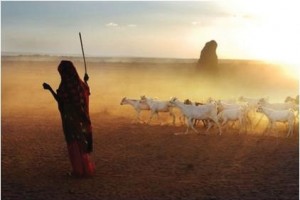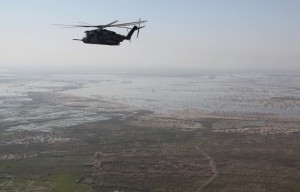Climate change will exacerbate regional and local tensions in ‘hot-zones’ around the world. In these regions, the impacts of a changing climate will act as an accelerant of instability by multiplying problems like water scarcity, food shortages, and overpopulation.
Climate Change and the Emerging Global Security Paradigm
These disruptions will burden civilian and military institutions around the world, including the U.S. military. According to the National Intelligence Council, by 2025 unprecedented economic growth, coupled with 1.5 billion more people will put pressure on the world’s resources – particularly energy, food, and water – raising the specter of scarcities emerging as demand outstrips supply.
The near-term impacts of climate change are likely to have a disproportionate effect on poor countries with weak governance structures, particularly in Africa and Asia. Over the next ten years, many states in these regions will experience water problems such as droughts, floods and overall poor water quality. Weak states may risk failure or increased regional tensions from the inability to cope with sudden shocks (such as drought) and long-term stresses (such as decreased agricultural yield).
 U.S Responsibility on Climate Change Security
U.S Responsibility on Climate Change Security
Because the U.S. is a global power with strategic interests around the world, these regions require Washington’s attention. These objectives include our interest in fighting terrorism, such as in the Horn of Africa; securing energy or mineral imports, like in West and Central Africa; or ensuring peace along heavily militarized borders, like in South Asia. Though climate change will have global implications, there are specific “hot-zones” that national security planners should focus on. These include Sub-Saharan Africa, South Asia, the Middle East, Latin America, the East Asia-Pacific, and the Arctic.
Global climate change is strategically important to the U.S. through its impacts on our regional stability of our allies. Climate change will also cause an increase in frequency of disaster relief responses by the U.S. military. American and foreign militaries have been increasingly deployed in a disaster response capacity for extreme weather events including the Russian wildfires in 2010 and the persistent droughts in East Africa in 2011. Responding to extreme weather events has become a frequent commitment by our armed forces and will likely continue to be in years to come as extreme weather events increase.
Why the U.S. Must Engage the World on Climate Change Security
Global climate change impacts are vital to U.S. security interests because they affect defense, diplomacy and economics.
 It is impossible to completely predict how factors like climate change, regional norms, water and food availability and governance and corruption could potentially affect one another. However, as the U.S. Department of Defense points out, climate change will act as an accelerant of instability in all of these areas and more.
It is impossible to completely predict how factors like climate change, regional norms, water and food availability and governance and corruption could potentially affect one another. However, as the U.S. Department of Defense points out, climate change will act as an accelerant of instability in all of these areas and more.
One of the most important lessons security planners should learn from our changing climate is to plan for the unexpected. Resilience and an ability to adapt will be key methods for preventing climate change from causing a collapse in global security.
Policy-makers and the public must be just as prepared for the effects climate change will have on the domestic security of the United States.
On November 1, ASP hosted a launch event for the “Climate Security Report.” To read an event recap and to access audio and video of the event, click here.
American Security Project’s Climate Security Report
To learn more about the costs of Climate Change, please visit any of the links below:
Climate Security Index
National Survey On Global Warming
FACT SHEET: Arctic Climate and Energy
Offshore Oil Drilling in the Arctic
A New Discourse: Climate Change in the Face of a Shifting U.S. Energy Portfolio
America’s Energy Choices: 2012 Edition
Pay Now, Pay Later: A State-by-State Assessment of the Costs of Climate Change
Degrees of Risk: Defining a Risk Management Framework for Climate Security
Climate Change and Immigration: Warnings for America’s Southern Border
ASP and Sierra Club Release Joint Report Outlining Dangers of Our Reliance on Foreign Oil and the Need for a New Transportation Infrastructure







